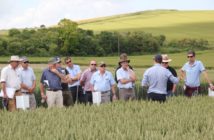Two leading UK crop research institutes are joining forces to create a major new centre for applied crop science and innovation.
East Malling Research (EMR) has become part of the NIAB group. This alliance, bringing together internationally renowned expertise in crop genetics, agronomy, environmental and data science, will strengthen NIAB’s ambition to lead the UK in crop innovation. EMR brings international leadership in top fruit and soft fruit research, complementing NIAB’s scientific expertise in arable crops, potatoes and ornamentals.
Both organisations have a focus on industry-facing, applied research aimed at addressing the challenges facing UK and global agriculture. The partnership will strengthen the UK’s crop science infrastructure and capabilities, with the pooling of complementary research expertise, and a shared commitment to the translation and application of science to support crop production in the UK and internationally.
In research terms, the integration will align EMR’s internationally renowned capabilities in horticultural and environmental science, including expertise in plant breeding, soil science, water use and biological pest control, alongside NIAB’s existing strengths in genetics and pre-breeding, variety evaluation, agronomy research, precision farming and informatics.
The combined organisation, employing more than 300 staff and with a turnover in excess of £22 million, will provide long-term stability, scale and capacity for investment in crop science. NIAB EMR will be established as a wholly owned subsidiary of NIAB, and will continue to operate from its existing site at East Malling in Kent.
CEO of the combined organisation, Dr Tina Barsby, said: “This is a vitally important time for crop innovation, with a rapidly advancing knowledge base and renewed interest in productive, efficient agriculture, driven by the challenges of global food security, climate change and resource conservation.The move creates a potent new force in independent applied research, bringing together the scientific expertise required to support progressive crop production at all levels, and represents a major step forward in NIAB’s plans. Our experience of merger and acquisition in recent years – including the successful integration of TAG and CUF as part of the NIAB business – puts us in a strong position to realise the full potential of a combined organisation.”



